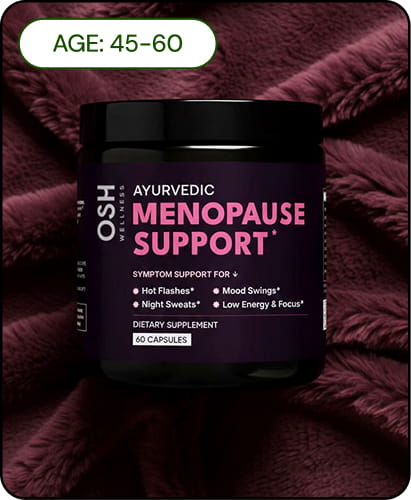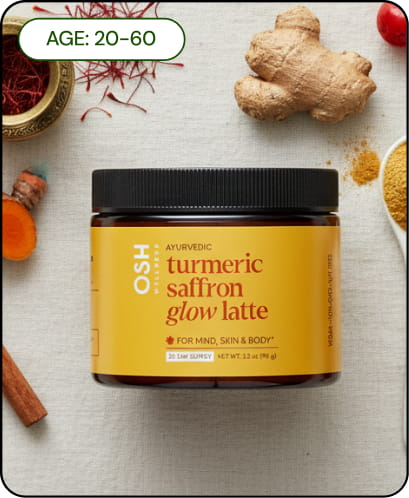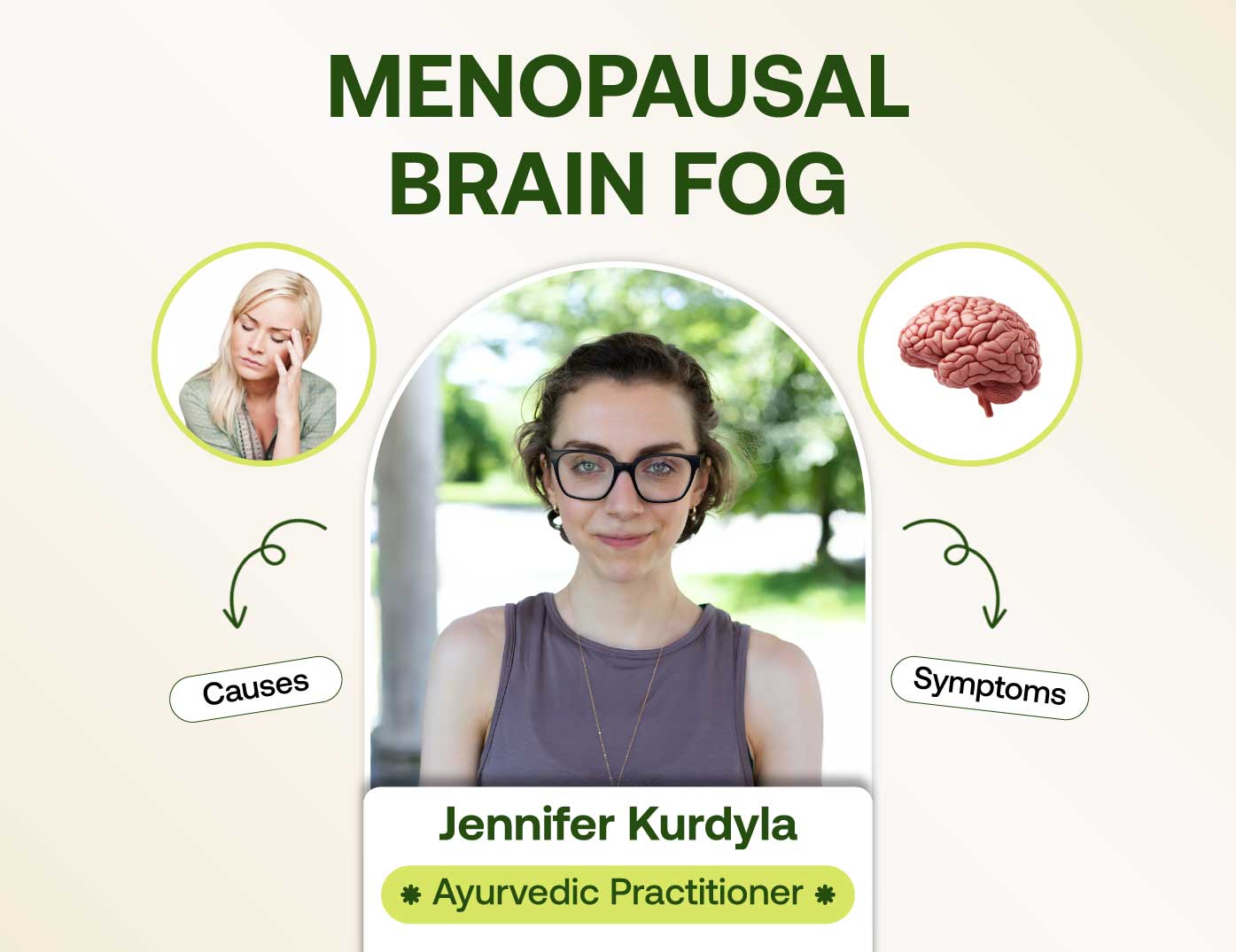Table of contents
Ashwagandha, an esteemed herb in Ayurvedic medicine, is emerging as a potential ally for women navigating the challenges of menopause. This natural adaptogen shows promise in alleviating common symptoms such as stress, anxiety, and sleep disturbances, which many women aged 40-60 experience during this transitional phase. By examining the research surrounding ashwagandha, we aim to uncover the ways it can help enhance the quality of life for those going through menopause.
Understanding Ashwagandha and Its Historical Significance

Ashwagandha (Withania somnifera), a cornerstone of Ayurvedic medicine, has been revered for over 3,000 to 5,000 years for its rejuvenating properties. Traditionally classified as a Rasayana, it promotes vitality, longevity, and holistic wellness. The roots are particularly valued for combating fatigue and enhancing energy, making it widely used across various age groups [1].
This herb is also known for its ability to calm the mind and support restful sleep, making it highly relevant for menopausal women facing insomnia and hormonal imbalances [2]. Historically, it supported immune function and was used by warriors and scholars alike for endurance and mental focus [3].
Ashwagandha is commonly consumed in the form of powders (ashwagandha churna), milk-based decoctions, and capsules. Its name, meaning “smell of a horse,” alludes to the vitality and strength it imparts [4]. Known as the "Prince of Herbs," ashwagandha remains relevant in addressing modern health concerns, including menopause-related issues.
Navigating the Menopause Journey

Menopause is a natural biological transition typically occurring between the ages of 40 and 55. This journey involves three stages:
Perimenopause: Hormone production gradually declines, leading to irregular menstrual cycles, hot flashes, night sweats, mood swings, and memory lapses [5].
Menopause: Defined as the absence of menstruation for 12 consecutive months, with intensified vasomotor symptoms and mood disturbances [6].
Postmenopause: Long-term phase marked by low estrogen levels, increasing risks of osteoporosis and cardiovascular issues [7].
These phases often come with physical and emotional disruptions like sleep loss, joint pain, and anxiety [8]. Effective management strategies include regular exercise, healthy nutrition, relaxation techniques, and medical therapies such as hormone replacement therapy (HRT) [9].
The Power of Adaptogens in Menopause

Adaptogens are natural substances that enhance the body’s resilience to stress, and ashwagandha is one of the most powerful among them. In menopause, its stress-regulating properties help support hormonal equilibrium while reducing symptoms such as anxiety, fatigue, and insomnia.
Research shows that ashwagandha helps stabilize cortisol levels, lowering perceived stress significantly, by over 50% in some studies [10]. Additionally, it supports adrenal and thyroid functions, thereby positively affecting hormones such as estrogen and progesterone [11].
Other notable benefits include:
Improved sleep quality by aiding melatonin production [12]
Reduction in fatigue through enhanced mitochondrial function [13]
Together, these benefits make ashwagandha a multifaceted remedy for improving resilience and hormonal stability during menopause.
The Benefits of Ashwagandha for Menopause

Ashwagandha has shown effectiveness in addressing a wide spectrum of menopause-related issues. These include:
Stress Reduction: Significantly lowers cortisol levels, improving anxiety and depression symptoms [14].
Hormonal Balance: Helps increase estrogen while reducing FSH levels, mitigating hot flashes and mood changes [15].
Reduction in Vasomotor Symptoms: Clinical trials show a marked drop in hot flashes and emotional fluctuations after 8 weeks [16].
Better Sleep: Leads to improved sleep quality, a key issue for menopausal women [17].
Cognitive Clarity: Counters “brain fog” by stabilizing neurotransmitter function [18].
Relief from Physical Discomforts: Eases joint pain and vaginal dryness [13].
Bone and Heart Health: Supports cardiovascular function and reduces osteoporosis risk [19].
Altogether, these benefits suggest that ashwagandha offers a well-rounded, natural approach to menopausal care.
Practical Usage of Ashwagandha

For optimal results, ashwagandha is best used in standardized doses. The typical dose ranges from 300 to 600 mg daily, split into two servings. Studies confirm that a 300 mg dose taken twice daily leads to substantial improvements in symptoms [18].
Most commonly available in capsule or extract forms, it works well when taken before meals. This enhances both efficacy and tolerability [20]. Supporting evidence from randomized trials with 100 women showed improved symptom scores and hormonal balance [21]. Another study confirmed better bone health in postmenopausal women following ashwagandha supplementation [22].
While generally safe, potential side effects include mild GI discomfort and possible insomnia. Long-term users may consider periodic monitoring of their liver function [23]. Always consult a healthcare professional before beginning any supplement regimen.
Concluding Thoughts and More Resources

Through a growing body of clinical research, ashwagandha emerges as a potent tool for alleviating a wide array of menopause symptoms. It demonstrates the ability to regulate estrogen and FSH, improve quality of life scores, and reduce physical and emotional discomfort associated with perimenopause and postmenopause [17].
Its hormonal modulating effects also extend into inflammatory regulation and bone health, two often overlooked aspects of menopausal wellness [24]. Supplements such as Sensoryl® and KSM-66 have shown particular promise.
Ultimately, combining informed supplementation with medical guidance can empower women to take a more comprehensive, natural approach to managing their menopausal journey.
Relevant Products
There is a growing selection of commercial menopause-support supplements leveraging these herbs. One example is Osh Wellness Menopause Support, which combines black cohosh, ashwagandha, and shatavari in clinically-informed dosages. Such products offer a convenient solution for those seeking natural relief from menopausal symptoms.
Conclusions
In conclusion, Ashwagandha for menopause stands out as a natural way to ease hormonal imbalance and support overall well-being. From balancing hormones to regulating stress and improving sleep, it serves as a promising support agent. Further research and individualized healthcare guidance can provide even greater insights into its role in women’s health.
FAQs
What are the main benefits of ashwagandha for menopause?
It helps reduce stress and anxiety, balances hormones, and improves sleep quality.
Is ashwagandha safe to use during menopause?
Generally, yes. Consult with a healthcare provider for individualized recommendations.
How long does it take to see effects from ashwagandha?
Many users report significant improvements within a few weeks of consistent use.
Sources
1: PMC - Ashwagandha: A Review
2: Wholistic Matters - Ashwagandha: An Ancient Herb for Modern Times
3: The Ayurvedic Clinic - A Comprehensive Guide to Ashwagandha
5: NCBI - Menopause and its Stages
6: Cleveland Clinic - Menopause
7: Summa Health - Preparing for Menopause
8: World Health Organization - Menopause
9: American Psychological Association - Easing the Transition into Menopause
10: NCBI - Adaptogens and Their Effects
11: Mind Lab Pro - Adaptogens for Perimenopause
12: Naydaya - Ashwagandha for Menopause
13: Healthline - Ashwagandha for Women
14: Life Extension - Ashwagandha Eases Menopause Discomfort
15: Australian Journal of Natural Medicine
16: Journal of Obstetrics and Gynecology Research
18: PubMed Central - Ashwagandha: Effects on Sleep and Stress
19: GoodRx - Ashwagandha in Menopause
20: Root Functional Medicine - Ashwagandha for Hormones
21: SAGE Journals - Menopause Symptoms
22: PubMed - Menopause & Bone Health
23: Healthline - Ashwagandha Dosage
24: Kerry Insights - Ashwagandha & Menopause
25: Sciety - Ashwagandha for Menopause: A Review







